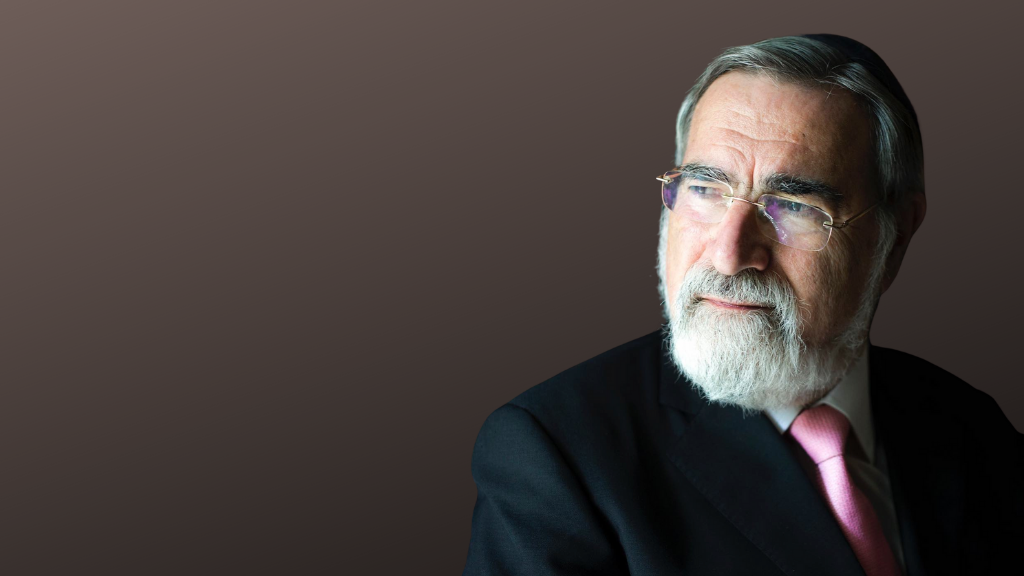Rabbi Lord Jonathan Sacks – a true leader
On 7th November, the world lost one of its greatest leaders: Rabbi Lord Jonathan Sacks.
Christians for Israel mourns the loss of this great man, who was an inspiration to us as a movement, and to millions of Christians around the world.
Rabbi Sacks, former Chief Rabbi of the United Hebrew Congregations of the Commonwealth, was a naturally shy person who grew to become an intellectual and moral giant – one of the greatest Jewish thinkers of the past century.
Rabbi Sacks was a scholar, but also a teacher and a leader. He took on the toughest moral issues of our era such as anti-Semitism, moral relativism, individualism, multi-culturalism, and religious conflict. In his many books, lectures, broadcasts, and teachings, as well as speeches in the House of Lords, he confronted the spiritual and moral significance of these phenomena head-on, explored their meaning for us as individuals and society, and never avoided advice on the practical ways in which they can and should be addressed.
For Rabbi Sacks, Judaism and the Jewish people were given to be a blessing to the world. He therefore constantly called on his Jewish brethren to return to the Bible, and to live full and fruitful lives faithful to orthodox Jewish teaching.
Just as important, he had a message for the whole world. His life of service was an example and challenge to all non-Jews – to discover and live lives of obedience to the God of Abraham, Isaac and Jacob, who created the Jewish people as His instrument of blessing, and who created all things and loves all people equally regardless of faith, race or nationality.
Sacks was as concerned about the persecution of Christians as he was about anti-Semitism, because he understood their common root: hatred of the God of Israel. A few years ago, in a Lords debate on the treatment of Christians in the Middle East, Sacks reminded his peers of some famous words of Martin Luther King: ‘In the end we will remember not the words of our enemies but the silence of our friends.’
His book Lessons in Leadership should be read by all who aspire to become leaders – in whatever field of endeavor. These lessons are explored in his weekly Covenant & Conversation series so that (as his website tells us) “people from all over the world can continue to learn and be inspired by his Torah”.
In a recent parsha (weekly teaching on the set portion of the Torah), Sacks wrote about how Abraham purchased the field of Machpelah in order to bury his wife Sarah (Genesis 23). Immediately afterwards, Abraham is blessed (Genesis 24:1). Then, unexpectedly – instead of resting on his laurels – at the ripe age of 137 – he engages in a new endeavor: to find a wife for his son Isaac. Why?
Because “leaders take responsibility for creating the conditions through which God’s purposes can be fulfilled. They are not passive but active – even in old age, like Abraham. That is what leaders understand, and it is what made Abraham the first Jewish leader.”
God promised Abraham two things: children and a land. “Despite this, when Sarah dies, Abraham has not a single inch of land that he can call his own, and he has only one child who will continue the covenant, Isaac, who is currently unmarried. Neither promise has been fulfilled. There is a moral here: God promises, but we have to act. And despite all the promises, God does not and will not do it alone.”
“Leaders begin with an envisioned future, but they also know that there is a long journey between here and there; we can only reach it one act at a time, one day at a time. There is no miraculous shortcut – and if there were, it would not help. Abraham acquired only a single field and had just one son who would continue the covenant. Yet he did not complain, and he died serene and satisfied. Because he had begun. Because he had left future generations something on which to build. All great change is the work of more than one generation, and none of us will live to see the full fruit of our endeavours. Leaders see the destination, begin the journey, and leave behind them those who will continue it. That is enough to endow a life with immortality.”
Rabbi Sacks followed Abraham’s example, and led us all by his example of humility, courage, obedience, and love.
Rabbi Sacks’ daughter Gila said at his funeral that her father taught her two things. First, that no problem is too difficult or too big to solve. “He taught us that we are called to be involved, to tackle big issues, and to change things – step by step”. Second, and most important, “he loved us so much, and never, ever missed an opportunity in recent years to tell us how proud he was of what each of us did, but mainly, for who we were”.
NOTE: you can sign up to receive Rabbi Sacks’ teachings via his website www.rabbisacks.org.




